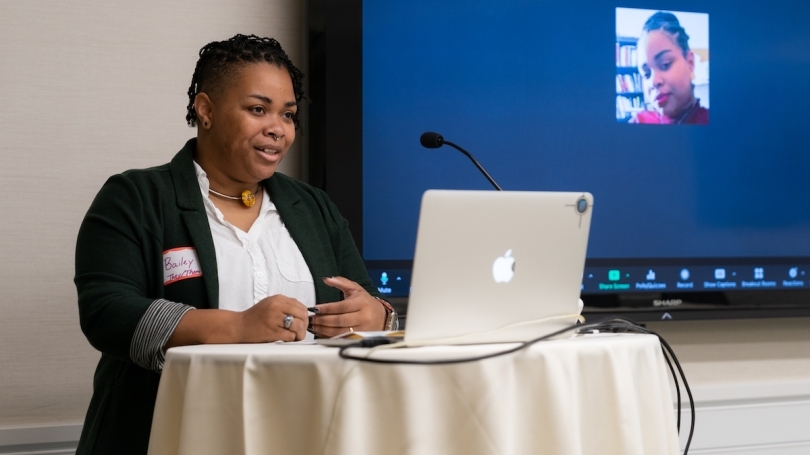
- People
- Curriculum
- Foreign Study
- News & Events
Back to Top Nav
Thomas launched the roundtable in 2019 to bring together scholars, activists, and artists across disciplines whose work highlights the intellectual contributions of Black women. "When I was a graduate student, I felt frustrated by the lack of community for Black feminist and womanist scholars," Bailey said. "There really wasn't a space dedicated to this area that also allowed people from different disciplines to engage in cross talk." Scholars from all ranks presented papers at the roundtable, from graduate students and postdoctoral fellows to senior scholars. Joy James, the Ebenezer Fitch Professor of Humanities at Williams College, and Omise'eke Tinsley, professor of Black studies at UC Santa Barbara, offered this year's keynote addresses. In her research, James explores incarceration and rebellion against police violence. Tinsley focuses on queer, feminist, Caribbean, and African American performance and literature.
"I chose this year's keynote speakers because their names kept coming up in gender and philosophy circles, " Bailey said. "I try to choose speakers that our community will be interested in hearing from, whose work intersects with multiple disciplines."
While the roundtable met in person this year for the first time, sessions were also accessible virtually, and some speakers participated via Zoom. "The economic effects of Covid make it difficult for some people to travel, so it's important to offer a hybrid experience," Bailey said.
Members of the public, and particularly Dartmouth community members, were encouraged to attend the event. In arranging the event, Bailey hoped that the schedule of speakers would be of particular interest to students.
"When I was a college student, I wasn't introduced to a text by a non-white woman philosopher until the spring of my junior year," Bailey said. "I've always wished that I had been exposed to Black feminists and theorists earlier in my college career. I hope that students are able to see that these topics are important and are academic pursuits."
Bailey also found inspiration for the roundtable in their maternal grandmother, who was the first Black woman to earn a PhD in philosophy from Vanderbilt University. "Due to racial and sexual discrimination, she wasn't able to receive a tenure-track position, despite her groundbreaking work in Black feminist theory," Bailey said. "I created this space in her honor."
The roundtable is supported by Dartmouth's Department of African and African American Studies, Department of Philosophy, Ethics Institute, Leslie Center for the Humanities, and Office of the Dean of Faculty.